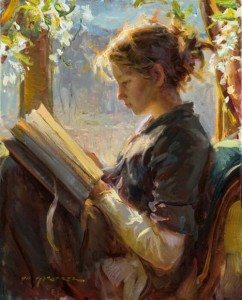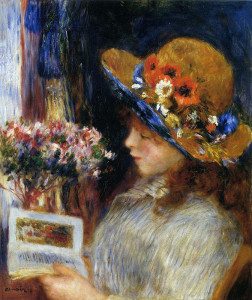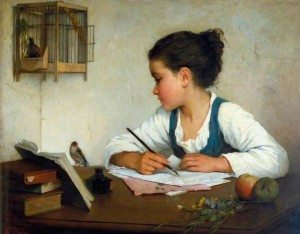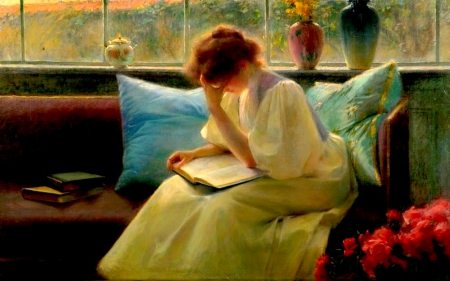The only way is English Literature
[dropcap]E[/dropcap]veryone knows that taking English at university is one of the best decisions you could make (three years of reading interrupted only by seminars and trips to to Curiositea for a daily caffeine fix? Perfection!) But should you be taking it in its pure form, or joint with another subject? Ahlam Al Abbasi, Emma Jones and Carmella Lowkis argue why their degree is the only way to study English Literature.
English Literature – Single Honours
 Being an English Literature student is like being the ultimate time traveller, but one who relies overmuch on their trusty copy of Travelling around the World for Dummies. In the beginning, it can be a whirlwind of experience. You hop from place to place, the dust barely settling before you’re off again, and always in the back of your mind you have to look for something.
Being an English Literature student is like being the ultimate time traveller, but one who relies overmuch on their trusty copy of Travelling around the World for Dummies. In the beginning, it can be a whirlwind of experience. You hop from place to place, the dust barely settling before you’re off again, and always in the back of your mind you have to look for something.
That something, I have discovered, is what I like to call the big ‘Why’ of English Literature. Why do you bother reading? Why do writers bother writing? Why should we care? We care because we are human. Our literature is human literature. The reason why we look at literatures from all times in all the hidey holes of the world is because we are all united in a joint enterprise of living. No matter what specific pathway you take in English Literature (whether it be English, North American, World or Theoretical), you are irrevocably forced into an international discourse on human behaviour. It is the English Literature student’s role to provide an analysis of the continuously changing face of humanity; and theorise an answer for the ‘Why’.
Ahlam Al Abbasi
[divider]
English and French
 If you love English, you probably love learning about other cultures (after all, literature allows us to travel indefinitely without leaving the comfort of our bedrooms) and you’re likely to be fascinated by language and the different ways it can be used. It’s pretty clear, then, that studying English with a foreign language is the best degree choice. Studying both English and French doesn’t reduce the time I get to spend engaging with literature. In fact, it gives me more opportunities to do this.
If you love English, you probably love learning about other cultures (after all, literature allows us to travel indefinitely without leaving the comfort of our bedrooms) and you’re likely to be fascinated by language and the different ways it can be used. It’s pretty clear, then, that studying English with a foreign language is the best degree choice. Studying both English and French doesn’t reduce the time I get to spend engaging with literature. In fact, it gives me more opportunities to do this.
A joint degree offers the advantage of studying a greater literary scope, given that texts from a completely different culture form the basis of half my studies. The most valuable and unparalleled advantage of studying English and another language is that by reading the books in their original language, rather than the translated versions you might find on an English course, you improve your understanding of, and fluency in, a second language. This opens realms of possibilities in terms of future travel and career plans, which are simply not available to those without a good grasp of another language. What I love about the English and French degree is the way it gives me the opportunity to fulfil the love of literature I’ve had since childhood, whilst developing a newer skill that gives me a much wider range of options for the future.
Emma Jones
[divider]
English Literature and Creative Writing
 There’s something about reading great works of literature that can’t help but inspire me to create my own. I find it impossible to thumb through something like Ibsen’s A Doll’s House without thinking “I want to be this good one day,” or – in the case of Conrad’s Heart of Darkness – “I could write something better than this with my eyes closed!”
There’s something about reading great works of literature that can’t help but inspire me to create my own. I find it impossible to thumb through something like Ibsen’s A Doll’s House without thinking “I want to be this good one day,” or – in the case of Conrad’s Heart of Darkness – “I could write something better than this with my eyes closed!”
Reading and writing are two disciplines that go hand-in-hand. Studying one is bound to increase your knowledge of the other. Why else were they lumped into a single subject in primary school? There’s no better way to understand an author’s horribly convoluted metaphors than being an author who writes horribly convoluted metaphors yourself. The effects of different metrical patterns are so much easier to understand when you’re using them to write poetry. Analysing a play’s structure becomes a doddle when you have played around with plot arcs. Besides, how can you comment on a writer’s choices unless you know what it’s like to make those choices? This is why I believe that English Literature is unequivocally better when taken in conjunction with Creative Writing: getting inside a writer’s mind is a walk in the park if you yourself are a writer.
Carmella Lowkis
[divider]
Is English Literature better with another subject or as a solo enterprise?
Make your voice heard @boarbooks
#towiel
Painting credits:
Thoughtful Reader by Franz Dvorak
The Garden Window by Daniel Gerhartz
A Young Woman Reading a Book by Pierre-Auguste Renoir
A Girl Writing by Henriette Browne


Comments